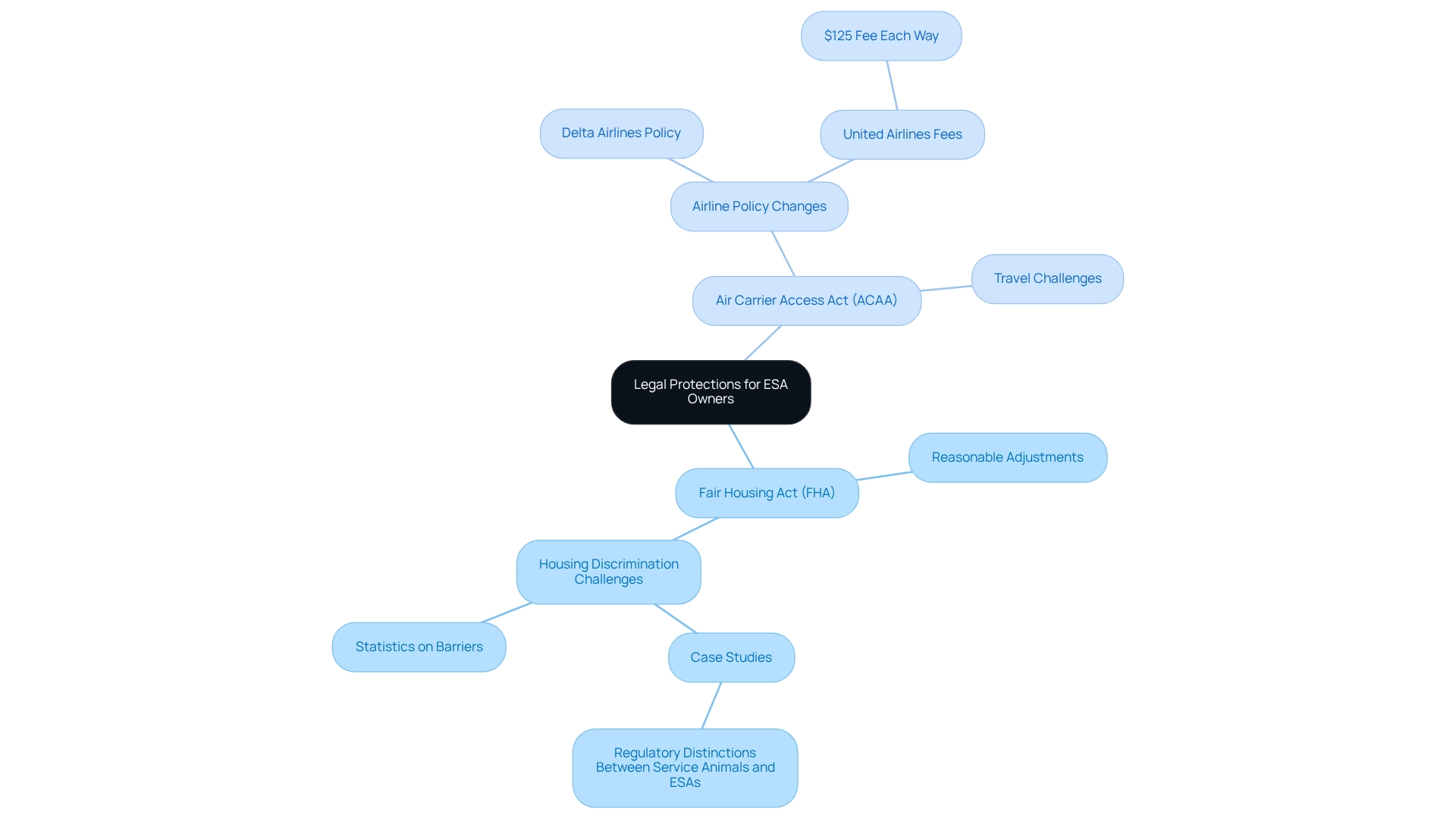

ESA Support Animal: Benefits, Legal Rights, and How to Obtain One
by Lena Park
Last updated: July 2, 2025
Verified and Approved by:
Angela Morris,
MSW, LCSW
Fact Checked

Overview
Emotional Support Animals (ESAs) offer crucial comfort and companionship to those navigating emotional or psychological challenges. Unlike service animals, which are trained for specific tasks, ESAs provide a nurturing presence that can make a significant difference in daily life. Many individuals struggle with mental health issues, often feeling isolated and overwhelmed. The presence of an ESA can alleviate these feelings, fostering a sense of security and connection.
The benefits of having an ESA are profound. They not only provide emotional support but also come with legal rights under the Fair Housing Act and the Air Carrier Access Act, ensuring that individuals can access housing and travel accommodations. Obtaining an ESA letter is a vital step in this process. This letter validates the need for emotional support and opens doors to necessary resources, making it easier for individuals to find comfort in their living and travel arrangements.
If you find yourself facing emotional challenges, remember that you are not alone. The journey to emotional well-being can be daunting, but the support of an ESA can be a compassionate solution. Consider how an ESA might enrich your life and provide the comfort you seek. The process of obtaining an ESA letter is designed to support you every step of the way, ensuring that you have access to the companionship and emotional relief you deserve.
Introduction
In a world that is increasingly recognizing the importance of mental health, many individuals find themselves grappling with emotional and psychological challenges. These struggles can feel overwhelming, often leading to feelings of anxiety, depression, and loneliness. In such times, Emotional Support Animals (ESAs) can emerge as vital companions, offering comfort and companionship that can make a significant difference in one’s emotional well-being. Unlike service animals, which are specially trained to perform tasks for individuals with disabilities, ESAs provide a unique form of support that is deeply nurturing.
As the legal landscape surrounding ESAs evolves, it becomes essential for those seeking support to understand their distinct rights in housing and travel. This knowledge empowers individuals to advocate for their needs effectively, ensuring that they can access the companionship that ESAs provide. This article delves into the definition of ESAs, their mental health benefits, the process for obtaining an ESA letter, and the legal protections that support owners in their journey.
Through this exploration, we will highlight the transformative impact of ESAs on individuals’ lives, emphasizing their role in enhancing emotional well-being. If you or someone you know is navigating the complexities of mental health, consider how an ESA might provide the comfort and companionship needed during difficult times. Together, we can shed light on the significance of these remarkable animals and the support they offer.
Define Emotional Support Animals and Their Distinction from Other Support Animals
Emotional Support Animals (ESAs), also known as esa support animals, play a vital role in providing comfort and assistance to those grappling with emotional or psychological challenges. Unlike service animals, which undergo specialized training for specific tasks, ESAs do not require such training. Their primary purpose as an esa support animal is to offer companionship, which can significantly alleviate symptoms associated with health issues like anxiety and depression.
This distinction is essential, as it directly impacts the legal rights and access that esa support animals have in various settings, including housing and travel. Under the Fair Housing Act, individuals with valid ESA letters are allowed to live in pet-restricted accommodations, ensuring they receive the support necessary from their esa support animal for their mental well-being. Similarly, the Air Carrier Access Act permits individuals to travel with their esa support animals, provided they have the required documentation. For example, Air Canada travelers must complete a U.S. DOT Service Animal Air Transportation Form, which includes vaccination details and certifies that their ESA is trained in specific supportive functions. Clients of Wellness Wag can expect to receive their official ESA letter within 24 hours after approval, showcasing the efficiency of the streamlined online process to obtain these crucial documents.
At Wellness Wag, we are committed to maintaining client confidentiality in compliance with HIPAA regulations, ensuring that personal medical information is handled with the utmost care. The growing reliance on esa support animals underscores their essential role in psychological health care. Research indicates that pet ownership can provide both preventive and restorative benefits for well-being. As highlighted by HABRI, “Service dogs provide essential assistance for individuals with mental and physical disabilities,” which contrasts with the companionship role of emotional support animals. Real-life stories illustrate how esa support animals have enabled individuals to secure housing in ‘no pets allowed’ environments, enhancing their emotional stability. The case study titled ‘Role of Emotional Support Animals’ further emphasizes that these animals offer companionship and assistance to those with psychological disorders, allowing them to live with their esa support animal in restricted housing, thereby improving their emotional well-being.
Understanding the legal differences between emotional support animals, including esa support animals, and service animals is crucial for individuals seeking to navigate their rights effectively. As we move toward 2025, the legal landscape continues to evolve, highlighting the importance of obtaining a legitimate ESA letter from a licensed psychological expert. This letter not only validates the need for an ESA but also empowers individuals to advocate for their rights in various situations. If you have any questions or concerns about ESA letters and privacy policies, please refer to our FAQs.
Explore the Mental Health Benefits of Emotional Support Animals
Esa support animals play a vital role in enhancing mental health, offering comfort and companionship to those grappling with anxiety, depression, and loneliness. Their presence can trigger the release of oxytocin, a hormone that promotes bonding and alleviates stress, while also lowering cortisol levels associated with stress. This biochemical response underscores the therapeutic potential of these animals in nurturing emotional well-being.
Many individuals with an esa support animal report significant improvements in their mood and emotional stability. A longitudinal study, approved by the University of Toledo Institutional Review Board, focused on adults with serious psychological disorders (SMI) and revealed that those living with ESAs experienced notable enhancements in bonding, reductions in anxiety and depression, and lower levels of stress biomarkers over a 12-month period. Participants expressed feeling more grounded and less isolated, with one individual sharing, “She is helping keep me even keeled. I think about a year ago if I had been in the situation I have been in lately, a year ago I would probably be in the hospital right now.” This heartfelt quote highlights the broader implications of the study, particularly regarding emotional stability and the potential decrease in hospitalization risk due to the support provided by emotional support animals.
The organized companionship that ESAs offer fosters a sense of purpose and routine, which is especially beneficial for individuals facing psychological challenges. Research consistently shows that the emotional assistance provided by these animals can be a crucial component of a comprehensive wellness strategy, enhancing overall well-being. As Glenn Close advocates for open discussions about emotional well-being, the importance of ESA support animals as valid support systems is increasingly recognized, emphasizing their capacity to significantly enhance the quality of life for those in need. Furthermore, ongoing research into the benefits of ESAs continues to highlight their role in psychological recovery, encouraging further dialogue about their positive influence.
Understand the Requirements and Process for Obtaining an ESA Letter
Acquiring an ESA letter begins with a compassionate understanding of your emotional needs. It’s essential to meet with a qualified psychological expert who can thoughtfully evaluate your situation. The process typically unfolds through these supportive steps:
- Assessment: Begin by taking Wellness Wag’s quick assessment to share your unique situation and emotional support needs. This initial step is crucial for grasping how an ESA can positively impact your emotional well-being. Once you submit the necessary forms, you’ll be connected with a licensed medical doctor for a personalized consultation that respects your individual journey.
- Evaluation: During your appointment, the psychological expert will carefully assess your circumstances, considering factors such as anxiety, depression, or PTSD. This evaluation is vital, ensuring that the recommendation for an ESA support animal aligns with your clinical needs. As noted by psychological professionals, the evaluation process is essential in establishing a clear link between the individual’s psychological needs and the assistance that an ESA support animal can provide.
- Letter Issuance: If approved, the professional will provide a signed letter confirming your need for an emotional support animal (ESA support animal). This letter is crucial for accessing housing and travel accommodations that welcome ESAs, ensuring you receive the legal protections afforded by the Fair Housing Act and Air Carrier Access Act.
- Follow-Up: Regular check-ins with your wellness provider may be necessary to ensure ongoing support and adherence to housing or travel regulations. Maintaining this connection is essential for both your emotional well-being and the validity of your ESA documentation. Remember, you are not alone on this journey; support is always available to help you thrive.
Examine Legal Protections for ESA Owners in Housing and Travel
Owners of emotional support animals (ESAs) experience significant legal protections under federal laws, particularly the Fair Housing Act (FHA) and the Air Carrier Access Act (ACAA). The FHA mandates that property owners provide reasonable adjustments for tenants with emotional support animals, allowing them to reside with their companions even in properties that typically prohibit pets. This provision is crucial for individuals grappling with mental health conditions, as it safeguards against discrimination based on their need for an ESA. As we look to 2025, the legal landscape continues to evolve, reinforcing the importance of these protections.
Under the ACAA, ESA owners are allowed to travel with their animals on airlines. However, recent updates have led to notable changes in airline policies regarding emotional support animals. For instance, Delta Airlines has stopped permitting emotional support animals on flights, opting instead to allow travel with pets under standard policies. United Airlines has introduced a fee of $125 each way for pets traveling under these standard policies, highlighting the financial considerations associated with traveling with pets. This shift emphasizes the importance of verifying specific airline regulations before embarking on a journey.
Real-world examples shed light on the challenges ESA owners encounter, especially concerning housing discrimination. Many individuals have successfully championed their rights under the FHA, underscoring the significance of understanding these legal frameworks. Statistics reveal that a considerable number of ESA owners have faced barriers in housing situations, reinforcing the need for ongoing awareness and advocacy. For example, the case study titled ‘Regulatory Distinctions Between Service Animals and Emotional Support Animals’ illustrates the differences in legal protections between service animals and emotional support animals, a crucial distinction for ESA owners to grasp. While service dogs enjoy full public access rights under the Americans with Disabilities Act (ADA), ESAs do not share the same level of access, making it vital for ESA owners to be informed about their specific rights and limitations.
Legal experts affirm that the FHA offers essential protections for ESA owners, ensuring they can live with their support animals without undue hardship. As Wellness Wag notes, “An ESA letter is valid for one year from the date of issue and must include the following components.” As interpretations of the ACAA evolve, it is essential for ESA owners to remain informed about their rights and the implications of recent policy changes, enabling them to navigate housing and travel with confidence.

Conclusion
Emotional Support Animals (ESAs) are invaluable companions that provide essential emotional and psychological support to individuals facing mental health challenges. These remarkable animals offer comfort and companionship, significantly alleviating symptoms associated with anxiety, depression, and loneliness. It is vital to understand the distinct roles of ESAs compared to service animals, as this distinction impacts the legal rights of ESA owners in housing and travel situations. The Fair Housing Act and the Air Carrier Access Act provide critical protections, allowing individuals to secure housing and travel with their ESAs, ensuring they have access to the support they need.
Obtaining an ESA letter is a straightforward yet crucial process, requiring consultation with a licensed mental health professional. This letter validates the need for an ESA, empowering individuals to advocate for their rights effectively. By following the necessary steps—assessment, evaluation, letter issuance, and follow-up—individuals can navigate the complexities of mental health support and legal protections with confidence.
In conclusion, ESAs play a transformative role in enhancing emotional well-being and fostering a sense of stability for those in need. As awareness of their benefits continues to grow, it is essential for individuals to understand their rights and the legal frameworks that protect them. By advocating for the importance of ESAs, society can help ensure that those who rely on these remarkable animals receive the support they deserve, ultimately contributing to a healthier and more compassionate community.
Frequently Asked Questions
What are Emotional Support Animals (ESAs)?
Emotional Support Animals (ESAs) are animals that provide comfort and assistance to individuals facing emotional or psychological challenges. Their primary role is to offer companionship, which can help alleviate symptoms associated with health issues like anxiety and depression.
How do ESAs differ from service animals?
Unlike service animals, which are trained to perform specific tasks for individuals with disabilities, ESAs do not require specialized training. Their main purpose is to provide companionship and emotional support.
What legal rights do ESAs have?
Under the Fair Housing Act, individuals with valid ESA letters can live in pet-restricted accommodations. The Air Carrier Access Act also allows individuals to travel with their ESAs, provided they have the necessary documentation.
What is required for traveling with an ESA?
Travelers with an ESA must complete a U.S. DOT Service Animal Air Transportation Form, which includes vaccination details and certifies that their ESA is trained in specific supportive functions.
How quickly can one obtain an ESA letter from Wellness Wag?
Clients of Wellness Wag can expect to receive their official ESA letter within 24 hours after approval.
How does Wellness Wag ensure client confidentiality?
Wellness Wag is committed to maintaining client confidentiality in compliance with HIPAA regulations, ensuring that personal medical information is handled with the utmost care.
What benefits do ESAs provide for mental well-being?
Research indicates that pet ownership can offer both preventive and restorative benefits for well-being, helping individuals improve their emotional stability and overall mental health.
Why is it important to understand the legal differences between ESAs and service animals?
Understanding these legal differences is crucial for individuals seeking to navigate their rights effectively, especially when it comes to housing and travel regulations.
What is the significance of obtaining a legitimate ESA letter?
A legitimate ESA letter from a licensed psychological expert validates the need for an ESA and empowers individuals to advocate for their rights in various situations.
Certify Your Emotional Support Animal Today

Why You Can Rely on Us?
At Wellness Wag, we believe your pet deserves care rooted in both science and compassion. Each article is carefully researched, written in clear language for pet owners, and then reviewed by qualified professionals to ensure the information is evidence-based, current, and practical for real-life care. Our goal is to help you feel confident in making informed decisions about your pet’s health and well-being.
Reviewed by
Angela Morris, MSW, LCSW
Angela is a licensed clinical social worker with 20 years of experience in patient advocacy and community mental health. She has assisted numerous clients with ESA evaluations and brings a deep understanding of disability accommodations, ensuring that all information is accurate, supportive, and practical.

Written by :
Lena Park
Last Updated :
July 2, 2025












